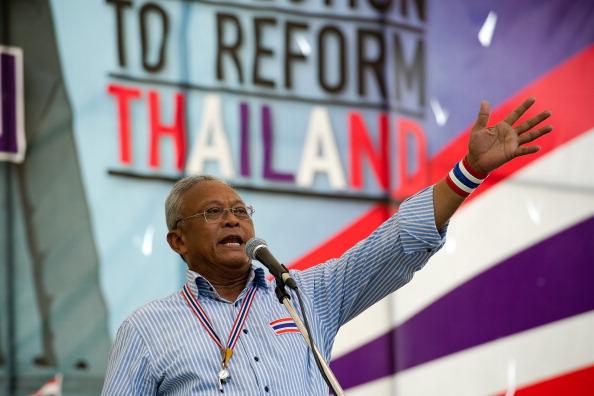BANGKOK—Anti-government protesters in Bangkok are escalating their campaign to oust Prime Minister Yingluck Shinawatra’s government by planning to take control of key road intersections in the Thai capital.
The protesters have said they will occupy at least 20 important locations in the main parts of the city starting Jan. 13, which they will hold until the government steps down.
Many of the targeted intersections are popular with tourists, such as Silom Road and several areas along fashionable Sukhumvit Road.
Ekanat Promphan, spokesman for the anti-government movement the People’s Democratic Reform Committee (PDRC), is calling the planned escalation “Occupy Bangkok.”
“We have been demonstrating for over 60 days, a lot of people have come out—we have had the largest demonstrations in Thai history but Yingluck remains indifferent. So we have to up the pressure,” Ekanat said.
Sixty-year-old Somsak lives close to the Siam shopping area on Sukhumvit Road, which is one of the areas the protesters plan to take over.
Somsak, who’s real name has been omitted because of concerns of reprisal, said he will go to show his support for the protesters because he thinks what they are doing is justified.
“If there are no protests, then this corrupt government will continue as it has and ruin the country’s economy,” Somsak said. “All Thais are affected by what’s happening.”
The protesters have also said that they will cut off electricity and water supplies at targeted government agencies and Prime Minister Yingluck’s private residence.
The Thaksin Factor
Initially the protests, which began in November, targeted a government amnesty bill, which would have allowed Yingluck’s controversial brother, former Prime Minister Thaksin Shinawatra, to return to Thailand from self-imposed exile and be cleared of criminal charges.
After the bill was quashed, the protest movement—which is supported by royalists, middle-class Bangkok residents, and southerners—began to focus on pressuring the Yingluck government to resign. More recently they have demanded the government rescind its decision to hold a snap election on Feb 3.
If held, the elections are certain to favor the Yingluck government, which is popular with rural voters in the north and northeast of the country.
Before any election can be held, the protesters say an unelected interim government needs to be put in place to carry out reforms that would root out corruption and the “Thaksin regime.”
Nonviolence Promise
Ekanat said the Occupy Bangkok campaign will try to minimize its effects on Bangkok residents by leaving at least one lane open for public use at the intersections they will occupy. He also stated his movement is committed to nonviolence.
“For two months we have been organizing rallies supported by millions of people with little violence—we insist on nonviolence. We won’t bring out any weapons, we won’t use any force to pressure Yingluck and the government.”
But hard-core protesters have clashed with police on numerous occasions in the past month and eight people have been killed in violence related to the political turmoil.
For some, like 38-year-old taxi driver Phongsak Jonglekha there are fears that the Occupy Bangkok campaign may create a situation similar to 2010 when pro-Thaksin red shirt protesters fought with the Thai military in Bangkok.
Ninety-two people were killed, mostly red shirts, during the 2010 mayhem, which was aimed at pressuring the Democrat party-led government to call an election, which would usher in a pro-Thaksin government.
“I don’t want to see a repeat of what happened then,” said Phongsak who declared he doesn’t support Thaksin and the Yingluck government or the PDRC protesters. “My condominium where I live was in an area affected by the fighting between the red shirts and the army. But as long as you weren’t involved in the situation it was okay.”
Phongsak said that when the PDRC protesters take over the 20 intersections on Jan. 13 it will be just like any other day on the job but he will avoid driving his taxi near the rally sites.
“I do see protest as a valid part of democracy, yet the protesters have to respect other people and they shouldn’t block the road as it creates hardships for others,” he said.
The Yingluck government has condemned the Occupy Bangkok plans with Deputy Prime Minister Surapong Tovichakchaikul, who is a relative of Thaksin, calling it illegal and saying that the participants could face harsh penalties.
“I urge those intending to join the rally to reconsider. Please do not support or join the illegal act that could destroy our beloved country,” Surapong said on national television.
The government has also warned that a “third party” may conduct acts of violence to drive the situation further out of control.
Coup and a Civil War?
Meanwhile, according to the Bangkok Post, leaders of the pro-government red shirt movement believe another military coup is being prepared, just as royalist army generals did against the Thaksin government in 2006.
There are also fears that the fierce political divide is driving the country closer toward a worst case scenario: a civil war.
Last week, the Bangkok Post, ran two opinion pieces stating that Thailand’s political crisis could develop into a civil war between pro-Thaksin red shirt forces in the north and northeast versus anti-Thaksin forces in the south and Bangkok.




